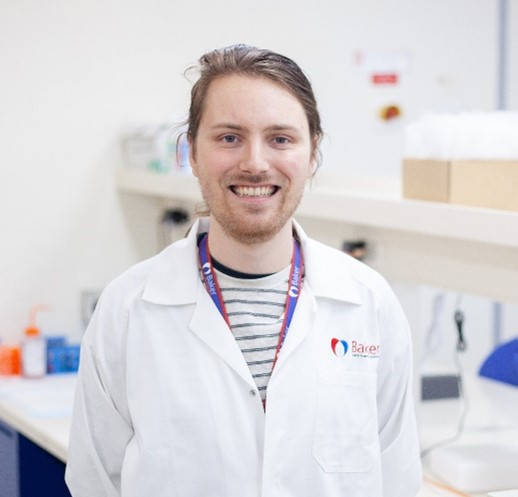We are profoundly grateful for the generous and visionary support of Baker Institute’s most promising young researchers by the Harold Mitchell Foundation.
Travel Fellowship recipient, Tom Collins

"Without this award I would not have been able to attend an internationally recognised conference in Spain and showcase my research."
Tom is a final year PhD student in the Haematopoiesis and Leukocyte Biology laboratory. Led by Professor Andrew Murphy, this group seeks to understand the changes in the immune system, often associated with chronic inflammation, that lead to cardiovascular and metabolic disease progression.
Tom’s research focuses specifically on understanding:
- how lipid metabolism impacts immune cell function; and
- how cardiovascular and metabolic diseases impact the lipid metabolism of immune cells.
He believes that the fat composition of immune cells could be used to determine an individual’s risk of developing heart disease and hopes to create a new risk prediction model for heart disease through his work.
With the support of the Harold Mitchell Foundation, Tom attended the Atherosclerosis Gordon Research Conference in Castelldefels, Spain this year. This is a premier, international scientific conference focused on advancing the frontiers of science through the presentation of cutting-edge research and novel techniques, with a focus on facilitating discussion and fostering interactions among scientists of all career stages.
It was an excellent opportunity and forum for Tom to showcase his research among globally recognised immunometabolism and cardiometabolic disease experts. He was able to connect with potential collaborators and the invaluable feedback he received from his oral presentation and poster has enhanced his PhD project immensely. Additionally, he gained a better grasp of the current immunometabolism research landscape and uncovered new approaches that will progress his current and future research.
Tom also visited two different University Medical Centres in the Netherlands, and the prestigious Oxford and Cambridge Universities in the UK where he presented his research, developing his public speaking skills as well as forming collaborations and learning new techniques.
Tom has returned with invaluable experience, new connections, and innovative ideas. It is through international exposure that researchers can draw on the scientific community to broaden the scope of their research and widen their networks, achieving greater impact and a brighter future for all.
Travel Fellowship recipient, Dr Aidan Walsh

"The new skills that I have developed during this travel will allow not only myself but our entire lab to explore new approaches for targeted imaging and diagnosis of cardiovascular diseases for years to come."
Aidan completed his PhD at the start of 2023 in the Molecular Imaging and Theranostics laboratory. A large proportion of his study was undertaken during the pandemic, and it is a mark of his passion and determination to have persevered throughout this challenging time, emerging as a confident, curious, and innovative researcher.
He has benefitted greatly from the guidance of his PhD supervisor and current laboratory head, Associate Professor Xiaowei Wang, who is a past recipient of the Harold Mitchell Travel Fellowship herself. She champions the benefits of international travel and collaboration, and believes it is integral for the development of key communication skills needed to amplify research impact.
Aidan and his laboratory group aim to improve diagnosis and therapy of cardiovascular diseases, harnessing the use and optimisation of imaging techniques, to better understand biological processes and improve the treatment of both the early developmental stages of disease, and the more acute thrombosis seen in heart attack and stroke.
With the support of funding provided by the Harold Mitchell Foundation, Aidan travelled to Europe in 2023, presenting at the World Molecular Imaging conference in Prague, Czech Republic, and undertaking a laboratory visit at Heinrich Heine University in Düsseldorf, Germany.
Aidan is passionate about the possibilities within reach through imaging, which provides a window into biology that enables discovery - the better we understand biological processes with all of the contextual influences intact, the more effective clinical therapies can become. Molecular Imaging lies at the heart of precision medicine, and Aidan is committed to pursuing advances in this field.
He presented data from his recently published journal article Activated coagulation FXII: a unique target for in vivo molecular imaging, at the conference. A worthy introduction to the global conversation, and vital experience disseminating his work, receiving feedback, and exchanging ideas.
The lab visit in Düsseldorf was Aidan’s first opportunity to collaborate firsthand with scientists outside of Melbourne, making new connections and seeding future opportunities. He received training for the operation of a highly promising imaging method, the 19Fluorine MRI. The new skills he gained will kickstart the next series of targeted molecular imaging studies here at the Baker Institute for faster and more accurate detection of thrombosis and inflammation, which he hopes will one day improve outcomes for patients in hospital settings.

